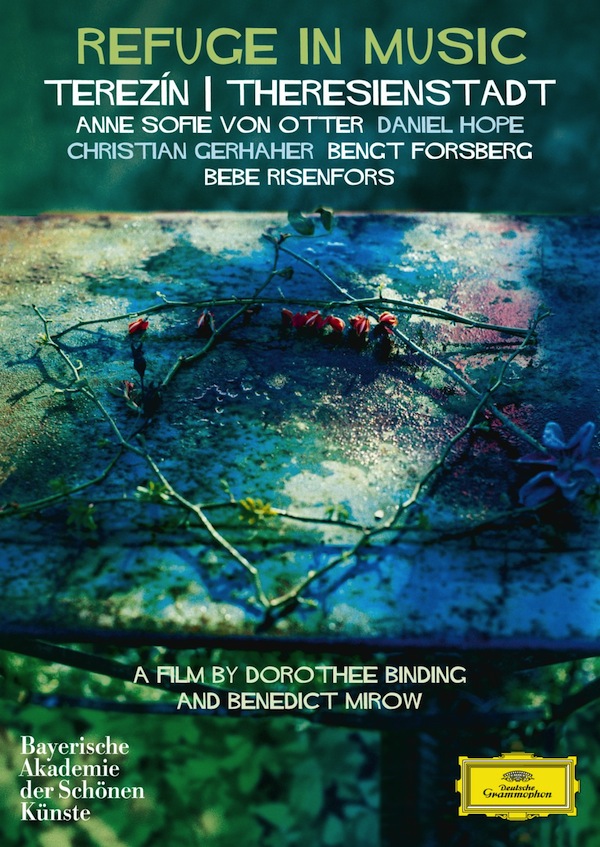
When music is the only refuge: An exemplary tribute
By Sebastian Spreng, Visual Artist and Classical Music Writer
“Ah, music!… From the very first note it penetrates the soul. We are no longer of this world!” sighs Alice Herz-Sommer, a pianist who at age 110 is the world’s oldest Holocaust survivor and, literally, the soul of the outstanding documentary Refuge in Music, by Dorothee Binding and Benedict Mirow. From her London apartment, the musician – who as a child met Franz Kafka and Gustav Mahler – remembers while British violinist Daniel Hope and jazz guitarist Coco Schumann undertake a journey back to the infamous Terezín camp. A testimony that music was and still is the only possible shelter.
As a matter of fact, Daniel Hope followed up on video a noble work that Anne Sofie von Otter initiated a decade ago: setting down for posterity the music composed at Theresienstadt. As in the original CD, she is partnered by her formidable pianist Bengt Forsberg and distinguished German baritone Christian Gerhaher. The project held special meaning for the great Swedish mezzo-soprano. Her father, Baron Göran von Otter, was stationed as a diplomat in Berlin in 1940 when, as a result of a chance encounter in a train with SS officer Kurt Gerstein, he learned of the Nazi regime’s atrocities. He informed the Swedish government, but his reports were conveniently shelved. More than a half century later, the singer not only adds a vital artistic legacy to the world’s musical repertoire but also honors her father’s memory. In every sense, this Refuge marks a full circle and a reflection of the healing power of music.
It is worth remembering that in the late 1990s, when the popularity of CDs was at its peak, producer Michael Haas was responsible for the Series Entartete Musik, music the Nazis labeled degenerate, published on the DECCA label. It was an essential edition. In many ways, Refuge in Music brings that enormous, historic anthology a step closer to completion. The DVD consists of two equally fascinating parts. The first records the journey the artists took to Theresienstadt, the medieval fortress about 60 miles from Prague that served as the horrifying ghetto where the Jewish intelligentsia of Bohemia and Moravia were interned. In a chilling display of cynicism, the Nazis showed it off to the world as a “model camp” that evinced the regime’s good intentions. Forced by the authorities, Jewish actor and director Kurt Gerron (1897-1944) made a film that was later disseminated around the world as propaganda. In an ironically sunny day; Hope, Gerhaher, Forsberg, Von Otter and accordion player Bebe Risenfors tour the buildings, sing, recite poetry and share their impressions. There is no trace of sentimentalism here, only a heartbreaking, respectful sorrow at the fate of colleagues who were, first and foremost, fellow human beings.
The second part consists of the concert itself held last year at the Bavarian Academy of Fine Arts in Munich. Musically superb, it is also suffused with exemplary respect and gravity, yet another feature that makes viewing this video obligatory. It is an obviously painful journey, but an indispensable one, given the quality of so much music composed in extreme situations, irrefutable testament to the indomitable human spirit. Multifaceted and comprehensive, the program could mirror a recital at one of the cabarets and theatres of Theresienstadt where operas like Der Kaiser von Atlantis were premiered. It includes the works of the first-class composers interned at the camp – Pavel Haas (1899-1944), Viktor Ullmann (1898-1944) , Hans Krása (1899—1944) and Erwin Schulhoff (1894-1942) – all later murdered in Auschwitz. Among many pieces, Hope and Forsberg superlatively perform Schulhoff’s Sonata for Piano and Violin, Karel Berman’s piano suite Reminiscences and Robert Dauber’s Serenade, another highlight of the evening.
In addition to her exquisite singing, Anne Sofie von Otter hosts and explains every part of the program, opening and closing the recital with the songs of Ilse Weber (1903-1944), the poet who went to the gas chamber accompanying the sick children that she cared for, including her own son. Weber’s Wiegala is a poignant lullaby that leaves an indelible impression on the listener. Anonymous songs, Karel Svenk’s Terezin March, Martin Roman’s Song of the Two Oxen and Carlo Taube’s A Jewish Child round out the collection, which ends on an optimistic note: I am sure I will see you again, by Adolf Strauss (1902-1944)
In sum, a heartfelt congratulation to the responsible, brave performers for the meticulous and impeccable creation of a document that confirms finding refuge in an essential spring, in water that cleanses and heals seemingly incurable wounds: MUSIC.
REFUGE IN MUSIC: DVD, DG 00440 073 5077 (Documentary: 58 minutes, concert: 105 minutes.)
Recent Content
-
Artsarticle ·
-
Artsarticle ·
-
Artsarticle ·
